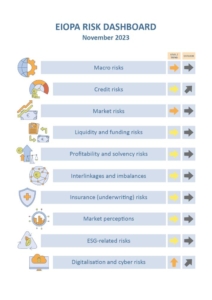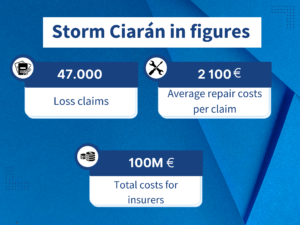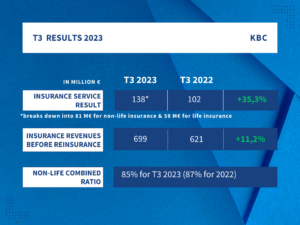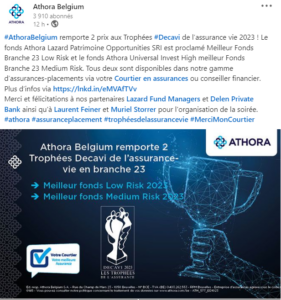In the dynamic field of insurance, risk management and data science, actuaries play a central role thanks to their unrivalled technical skills.
Throughout their careers, some have the opportunity to reach management positions. This transition can seem daunting, especially as the actuary’s image is often associated with introversion. Moreover, moving towards managerial responsibilities does not rely solely on technical skills. Indeed, this professional transition, although promising, is faced with a major challenge: the gap often observed between technical skills and managerial capabilities. In this context, this article explores the non-technical skills, or ” interpersonal skills “, that are essential for actuaries moving into managerial positions.
We will explore four essential skills for actuaries with managerial responsibilities: emotional intelligence, the ability to embrace change, communication, and pedagogy and the willingness to learn. Enhanced by the enlightened advice of our recruitment expert Loïc Riguelle, we will attempt to inspire actuaries transitioning to managerial positions on the crucial importance of these skills. By understanding and integrating these skills into their professional arsenal, actuarial managers will be able to better navigate this changing professional landscape, strengthening both their leadership and the performance of their teams.

Emotional intelligence
As in many other fields, emotional intelligence plays a key role when team management is at the heart of the profession. In the highly complex fields of actuarial science, risk management and data science, managers need to inspire and motivate their teams around highly technical subjects. Having strong emotional skills enables them to understand the emotions and individual needs of team members, strengthening interpersonal relations and fostering cohesion.
In addition, emotional intelligence helps managers to communicate more effectively with their teams, since they can adapt their communication style to the emotional needs of each member of their team. Such interpersonal quality also facilitates decision-making, as the social and emotional aspects of different team members are taken into account, resulting in decisions that meet the team’s needs.
Last but not least, emotional intelligence helps to deal constructively with conflict in an ever-changing professional environment, creating a healthy and productive working environment.
“Emotional intelligence should not be underestimated in the actuarial field. Many of our clients challenge and assess candidates on this skill for jobs with responsibilities or that require significant exposure.”
Loïc believes that this skill is necessary in order to be able to adapt to one’s interlocutor, but it is also essential in order to create a real sense of team spirit and unite these members by giving a common direction to the group.
Not everyone is born with the ability to manage a team, but without emotional intelligence, it is difficult to effectively lead a team. Emotional intelligence fosters harmonious relationships, informed decision-making and professional management of interpersonal challenges within the team.
The ability to embrace change
The ability to embrace change seems to be an essential interpersonal skill in an industry where change and new trends are commonplace. However, change can also come from an internal decision, as in the case of organizational restructuring. For this reason, the ability to embrace change involves two essential axes: adaptability and innovation.
To begin with, adaptability is a must in the insurance industry. Managers must therefore be able to adjust their strategies and approaches in line with changing industry trends, regulations and emerging technologies, but also when it is necessary to review the team’s structure and organization. Being open and responsive to change enables them to quickly modify their plans and processes to align with new requirements and working methods, ensuring the sustainability and flexibility of their teams.
Innovation is another pillar of this ability to embrace change, which is closely linked to the first point mentioned. Encouraging innovative thinking within actuarial teams fosters the emergence of creative solutions to emerging challenges. Teams that are open to new ideas and methodologies are more likely to find innovative approaches, thus strengthening in-house innovation.
Managers can be opposed to change if the current team organization and situation are delivering excellent results. However, Loïc considers that when change happens, managers have a duty to instigate it.
” In the actuarial sector, companies are increasingly tending to update the programming languages they use. Some actuaries are sometimes reluctant to switch from SAS and VBA to more modern tools like Python and R, and yet this transition is taking place.”
When transformation is impending, whether positive or negative for the team, the latter needs to be supported by managers.
“This skill has two essential components: the importance of maintaining team cohesion, while ensuring that all employees are involved in the transformation that is taking place.”
By combining adaptability and innovation, managers can guarantee the success and continuous growth of their teams in a constantly changing professional environment.
Communication
Good communication skills are highly sought-after in the actuarial field, and not only for future managers. However, the ability to communicate clearly cannot be underestimated, whether to senior management or to teams.
Actuarial team managers interpret complex data for non-technical audiences. It is therefore necessary to be able to popularize and synthesize technical concepts, whether through oral presentations, written reports or daily interactions for a range of audiences, including team members, senior executives and clients.
Actuarial team managers also need to be good listeners and good observers when communicating. Communicating also means asking questions before forming and expressing an opinion. It is important to develop active listening skills, which are defined as the ability to listen and observe the body language and reactions of others when communicating a message.
Managers’ ability to communicate effectively depends on their ability to act as a relay between the hierarchical levels above and below them. To their higher-ups, they must be able to collect, select and synthesize the information received by their team members and act as their spokesperson, possibly defending their colleagues and their work. To their subordinates, communicative managers must pass on decisions, explaining and embodying them.
“We’ve already had candidates fail their asssessment because they didn’t have the ability to bring concrete information to their team properly,” explains Loïc, “Being structured in your communication and able to express something tangible is essential for this responsibility. Obviously, this can be worked on.”
Moreover, communication needs to be moderated, says Loïc. “Managers will always know more than team members. That’s why you need to be able to filter and determine the amount of information to share within your team, as this determines the decisions that will be taken.”
Open and clear communication creates a powerful bond between manager and team, fostering an environment where ideas are shared, challenges are overcome and goals are achieved.
Pedagogy and the willingness to learn
When it comes to managing actuarial teams, pedagogy is of crucial importance in promoting learning. Above all, managers role is to coach and train their team. One of the aspects to focus on is enabling the team to grow technically, by acquiring new knowledge and skills.
” The desire to develop a new technical skill is something actuaries look for a lot, and it’s particularly what they expect from their manager.”
If team lack a certain know-how or technical skill, and managers are experts in the field, they must be able to provide their team members with the tools they need to understand and acquire this knowledge.
However, if managers are not the most expert on the subject, they must be able to surround themselves with team members who are experts in subjects other than their own, whom they can promote and make responsible for the skills development of other team members. This increases the value of employees, encourages mutual support and cross-functional knowledge, and reduces operational risk on a given subject.
In addition, actuarial team managers are expected to work in multidisciplinary teams, which means taking into account different perspectives, approaches and technical knowledge. This diversity means cultivating an environment where team members feel stimulated to share their knowledge and collaborate actively. For a highly technical profession such as actuary, allowing each member of the team to deal with the subjects that interest them is an opportunity not to be missed, says Loïc.
“As a manager, it’s crucial to understand the interests and preferred subjects of your employees, so as to enable them to develop in these areas.”
Finally, it is essential to be able to identify your employees’ valuable skills, and seize the opportunity to develop them.
Pedagogy is a major asset not to be overlooked. The combination of an appropriate pedagogy and a propensity for continuous learning is an essential lever for maximizing the performance of actuarial teams, and thus ensuring cutting-edge expertise within the organization.
In conclusion, we have explored in depth four essential human skills for actuaries moving into managerial positions. Each skill listed echoes the need that the actuary does not naturally have in his or her business knowledge. By integrating these non-technical skills with their technical expertise, actuaries transitioning to managerial positions can cultivate holistic leadership. This will enable them to guide their teams with empathy, promote innovation, create inclusive working environments and maintain their competitiveness in a constantly evolving sector. In short, the balance between technical and soft skills is the key to successful team management in the complex field of actuarial, risk management and data science.
Sources:
 As we discussed last month, a new law regarding the cancellation of an insurance contract was being debated in the House. It has now been published in the official government bulletin and will come into effect on 1 October 2024.
As we discussed last month, a new law regarding the cancellation of an insurance contract was being debated in the House. It has now been published in the official government bulletin and will come into effect on 1 October 2024.















